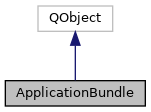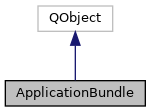Represents an application bundle or executable in various formats. More...
#include <ApplicationBundle.h>


Public Types | |
| enum class | Type { Unknown , AppBundle , AppDir , AppImage , DesktopFile } |
| Enumerates the different types of application bundles. More... | |
Public Member Functions | |
| ApplicationBundle (const QString &path) | |
| Constructs an ApplicationBundle object for the specified path. More... | |
| QString | path () const |
| Returns the path of the application bundle. More... | |
| bool | isValid () const |
| Checks if the application bundle is valid and exists. More... | |
| Type | type () const |
| Returns the type of the application bundle. More... | |
| QIcon | icon () const |
| Retrieves the icon of the application bundle. More... | |
| QString | iconName () const |
| Retrieves the name of the icon file. More... | |
| QString | name () const |
| Retrieves the name of the application. More... | |
| QString | executable () const |
| Retrieves the path to the executable of the application. More... | |
| QStringList | arguments () const |
| Retrieves the list of arguments passed to the executable. More... | |
| bool | isCommandLineTool () const |
| Checks if the application bundle is a command line tool. More... | |
| QString | typeName () const |
| Gets the name of the type as a string. More... | |
| bool | launch (QStringList arguments) const |
| Launches the application. More... | |
| QIcon | quadraticIcon (QIcon icon) const |
Public Attributes | |
| QString | m_path |
| bool | m_isValid |
| Type | m_type |
| QString | m_name |
| QString | m_icon |
| QString | m_executable |
| QStringList | m_arguments |
Detailed Description
Represents an application bundle or executable in various formats.
The ApplicationBundle class provides methods to work with different types of application bundles, including AppImages, AppDirs, desktop files, and regular executables. It can be used to retrieve information about the application, such as its type, icon, name, executable path, and arguments.
The class supports multiple types of application bundles, each identified by its Type. Application types include AppBundle (application bundle directory), AppDir (AppImage-like), AppImage (AppImage executable), and DesktopFile (desktop entry).
Member Enumeration Documentation
◆ Type
|
strong |
Constructor & Destructor Documentation
◆ ApplicationBundle()
| ApplicationBundle::ApplicationBundle | ( | const QString & | path | ) |
Constructs an ApplicationBundle object for the specified path.
- Parameters
-
path The path to the application bundle.
Member Function Documentation
◆ arguments()
| QStringList ApplicationBundle::arguments | ( | ) | const |
Retrieves the list of arguments passed to the executable.
- Returns
- The list of arguments.
◆ executable()
| QString ApplicationBundle::executable | ( | ) | const |
Retrieves the path to the executable of the application.
- Returns
- The executable path.
◆ icon()
| QIcon ApplicationBundle::icon | ( | ) | const |
Retrieves the icon of the application bundle.
- Returns
- The icon.
◆ iconName()
| QString ApplicationBundle::iconName | ( | ) | const |
Retrieves the name of the icon file.
- Returns
- The icon name.
◆ isCommandLineTool()
| bool ApplicationBundle::isCommandLineTool | ( | ) | const |
Checks if the application bundle is a command line tool.
- Returns
- True if the application is a command-line tool, false otherwise.
◆ isValid()
| bool ApplicationBundle::isValid | ( | ) | const |
Checks if the application bundle is valid and exists.
- Returns
- True if the bundle is valid, false otherwise.
◆ launch()
| bool ApplicationBundle::launch | ( | QStringList | arguments | ) | const |
Launches the application.
- Parameters
-
arguments The list of arguments to pass to the application.
- Returns
- True if the application was launched successfully, false otherwise.
◆ name()
| QString ApplicationBundle::name | ( | ) | const |
Retrieves the name of the application.
- Returns
- The name.
◆ path()
| QString ApplicationBundle::path | ( | ) | const |
Returns the path of the application bundle.
- Returns
- The path.
◆ type()
| ApplicationBundle::Type ApplicationBundle::type | ( | ) | const |
Returns the type of the application bundle.
- Returns
- The type.
◆ typeName()
| QString ApplicationBundle::typeName | ( | ) | const |
Gets the name of the type as a string.
- Returns
- The type name.
Member Data Documentation
◆ m_arguments
| QStringList ApplicationBundle::m_arguments |
The list of arguments.
◆ m_executable
| QString ApplicationBundle::m_executable |
The path to the executable.
◆ m_icon
| QString ApplicationBundle::m_icon |
The path of the application's icon.
◆ m_isValid
| bool ApplicationBundle::m_isValid |
Indicates if the bundle is valid.
◆ m_name
| QString ApplicationBundle::m_name |
The name of the application.
◆ m_path
| QString ApplicationBundle::m_path |
The path of the application bundle.
◆ m_type
| Type ApplicationBundle::m_type |
The type of the application bundle.
The documentation for this class was generated from the following files:
- ApplicationBundle.h
- ApplicationBundle.cpp